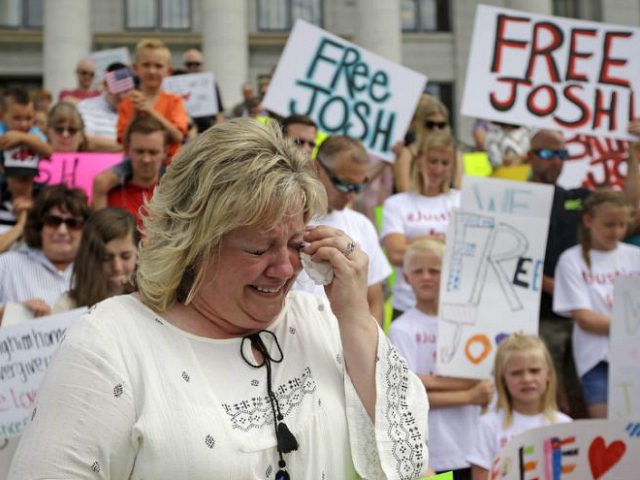The parents of an American being held hostage in Venezuela published a stern column condemning the Obama administration’s treatment of the families of hostages, arguing that the government only helps those families with the skill to navigate the “byzantine bureaucracy of the U.S. government.”
“The families who have the most access and most success with our own government are those who understand how to work the system,” argue Jason and Laurie Holt in The Washington Post. The Holts are Utah natives whose son, Joshua Holt, is currently languishing in a Venezuelan prison since his arrest on questionable illegal arms charges in August.
Holt traveled to Venezuela to meet Thamara Caleño, his fiancée he had met online. After a honeymoon on Margarita island, Venezuela’s military police raided the couple’s home and claimed to find illegal weapons in their possession. Witnesses alleged to have seen the police walking into the apartment with weapons and planting them there before the raid.
The state charged Holt with “terrorism” in June, though he has yet to have his day in court because the judge in his case has repeatedly been absent for court dates without reason.
His parents say he is being tortured in prison.
“Every time we speak out, prison officials punish and threaten him, denying him access to visitors,” they write in The Post. “They recently forced him to undress and respond to humiliating commands while naked, violating Josh’s Latter-day Saints religious beliefs and practices. The prison has also repeatedly refused court-ordered medical treatment for his deteriorating health.”
“We are afraid to speak out because we don’t know what horrors it will bring for Josh. And yet to not speak out carries its own punishment,” the couple writes, “for it is only through public pressure that we’ve been able to get our government’s attention.”
The Holts argue that they have not received proper attention from the U.S. government “because a foreign government and not a terrorist group holds our son,” and the legal framework for hostage crises is designed for cases involving non-state actors.”
Adding insult to injury, Laurie Holt told local news earlier this month that officials had told her family Holt would return with Secretary of State for Political Affairs Tom Shannon, currently assigned to a special envoy role with the Venezuelan socialist regime. Shannon reportedly made a personal plea to dictator Nicolás Maduro to allow him to take Holt home.
Shannon has told reporters that he believes dialogue between the Venezuelan dictatorship and the pro-democracy opposition will only be possible if the government releases its prisoners of conscience, though most of these are Venezuelan nationals active in the opposition. “In many ways, the government holds the key to success in this dialogue because they keep detained these prisoners… for the process to be a success [the government] must deal with the political prisoner situation.”
Holt is one of twelve American citizens currently kept as a hostage in Venezuela. Not all their names are public, though at least one other family, that of Todd Michael Leininger, has gone public with their story.
Venezuela’s government enjoys close ties with two nations that have used U.S. citizen hostage-taking as a lucrative fundraising maneuver: Iran and Cuba. The U.S. government paid Tehran $400 million in a deal for the freedom of The Washington Post journalist Jason Rezaian, Marine veteran Amir Hekmati, Christian pastor Saeed Abedini, and Nosratollah Khosravi-Roodsari. The White House rejected using the term “ransom” for this exchange.” In 2014, Cuba agreed to release political prisoner Alan Gross in exchange for the liberation of the remaining communist spies in the group known as “The Cuban Five,” as well as the removal of a variety of business sanctions that would net Havana millions in trade and tourism.

COMMENTS
Please let us know if you're having issues with commenting.